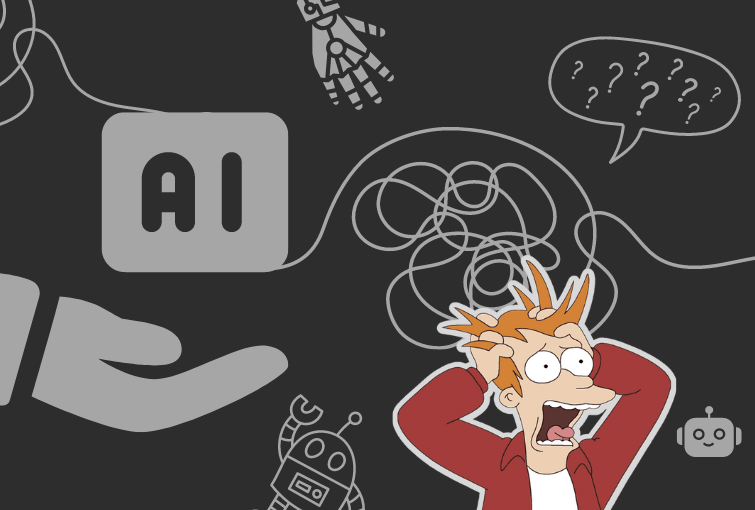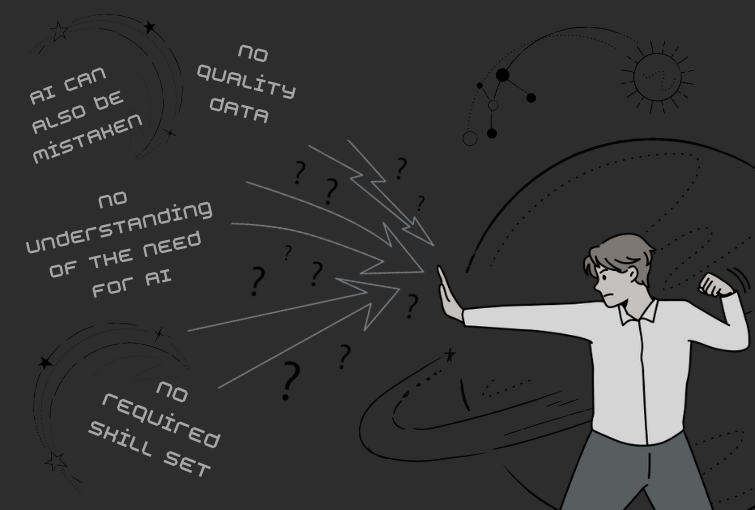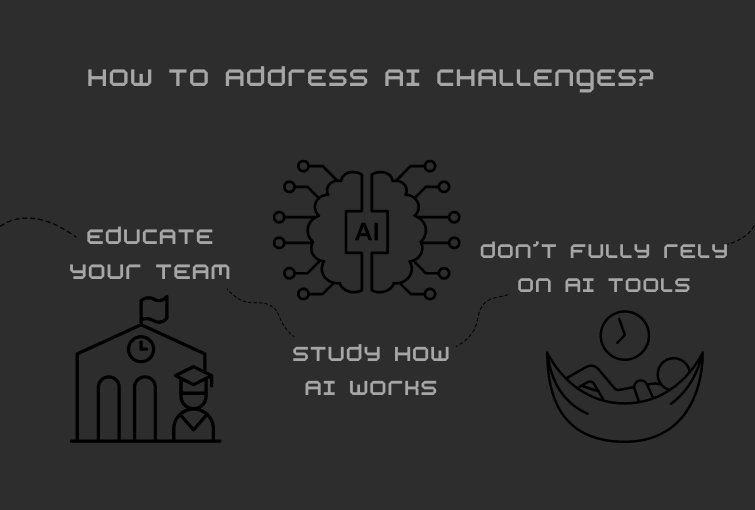
Only 10% of companies gain financial benefits from adopting artificial intelligence. We’ve started with shocking statistics. Most articles about AI show us how wonderful and useful this tool is, which is an absolute truth. But AI, like any technology, is not a magic pill against all business challenges, and in fact, it challenges businesses in some ways.
According to MIT Sloan Management research, which gave us that surprising number from the beginning, one of the main reasons for such statistics is that many companies lack organizational learning and have trouble adapting to AI. And today, we’re willing to discuss certain difficulties businesses may face during artificial intelligence implementation.
Let’s start with the benefits of artificial intelligence in business
We know the balance between bringing “good” and, let’s say, “confusing” news, so decided to start with some pleasant information. Sure thing, AI benefits depend on the type of software and the objectives a company uses it for. And there is a difference between AI use in CRM and CMS, for example. However, all AI-powered tools have some common pros.
AI helps to automate workflows
Have you ever thought about how many repetitive tasks we complete every day and how much time it takes from us? Back in 2017 SmartSheet report about automation at the workplace showed that 59% of employees could save over six hours weekly if they had their repetitive work aspect was automated. AI, in turn, is the leading automation tool, and it takes a considerable part of employee duties, like emailing, scheduling, research, and analytics.
It never sleeps and can work 24/7
AI works non-stop so that it won’t miss any piece of data and can operate even when you’re not available and enjoy your sweetest dreams. It’s really helpful when you can’t work for one reason or another and cannot reply to some emails, for example. Due to its availability, AI also enables a comprehensive analysis of your business performance.
Reduces the number of human mistakes
Human error is a pretty common situation, and if one can bring nothing but an inconvenience, another may be fatal. Most errors are related to people’s forgetfulness, irresponsibility, carelessness, or lack of expertise. Artificial intelligence, in turn, always operates under the algorithms, which means it will do just exactly what it has to do, without any delays and gaps.
A great decision maker
AI won’t decide anything for you if you don’t let it. But it will definitely help a lot. Because of the vast amount of information artificial intelligence tools store, process, and analyze every second, they can understand your business more, study your customers and previous cases, and suggest the best ways your company can grow.
However, AI challenges your company

Even though you get a lot of benefits from adopting AI, it doesn’t mean the process of adoption is going to be easy. Every change in our life is a challenge and requires effort and a certain attitude. So, let’s take a closer look at the challenges AI implementation brings.
No understanding of the need for AI
In some companies, employers have a really harsh time explaining to their employees the need for artificial intelligence. If workers don’t understand why they have to change their habits and the whole workflow, if they don’t realize all the benefits they get afterward, they either won’t use new tools at all or use them in the wrong way.
No required skill set
So, the wrong way usage. Yeah, AI tools are adopted for business automation. But it doesn’t mean that your team members won’t do anything and don’t have to develop some new skills. Technologies are made to complement us, not to replace.
No quality data
AI requires access to different data in order to actually help. The more information about your business and clients it gets, the better algorithms work and the more valuable business insights you get. And the problem with some companies is that they either don’t have many sources of such data or didn’t collect any before. Thus, it takes more time and effort for artificial intelligence tools to start working effectively.
AI can also be mistaken
Yes, artificial intelligence is not always right. Sometimes it’s the lack of information to make an informed decision or suggestion, but sometimes AI algorithms just don’t understand us correctly.
And how to address AI challenges?

Since we attacked you with various issues you might face implementing AI into your company workflow, it would be unfair to just leave you with them. So, we’ve prepared a few tips on how to ease the process of artificial intelligence adoption.
Educate your team
Don’t ask for an immediate understanding of new working strategies from your employees, but rather be patient, attentive, and helpful. Show your team how AI works, hire a specialist who can explain the basis, create a “How-to” instruction for new software, if needed, and let your workers feel comfortable asking questions.
Study how AI works
Educate your team, but don’t forget to educate yourself too. Learn more about AI algorithms and how they work. Make sure you understand all pros, challenges, and resolutions. Study the tools you want to use, learn how to compare and find the best one, whether it’s a CRM you need to choose or a chatbot.
Don’t fully rely on AI tools
Remember one simple truth: artificial intelligence is a great tool, but for any tool, the hand is required. Robots can’t work totally independently without human intervention. They’re made to help us, but they still may need help themselves. Not to say about double-checking everything we get from them.
Imagine AI as one more team member who can perform much faster than you. It’s your project partner who you need to cooperate with and contribute your skills and knowledge equally.
Conclusion
To conclude, the business challenges we get with AI adoption are nothing else but our impetus to grow. We learn a lot from this technology, but also need to be ready to teach both our teams and artificial intelligence itself. So, good luck on your journey to business automation, and have an excellent time cooperation with AI.





